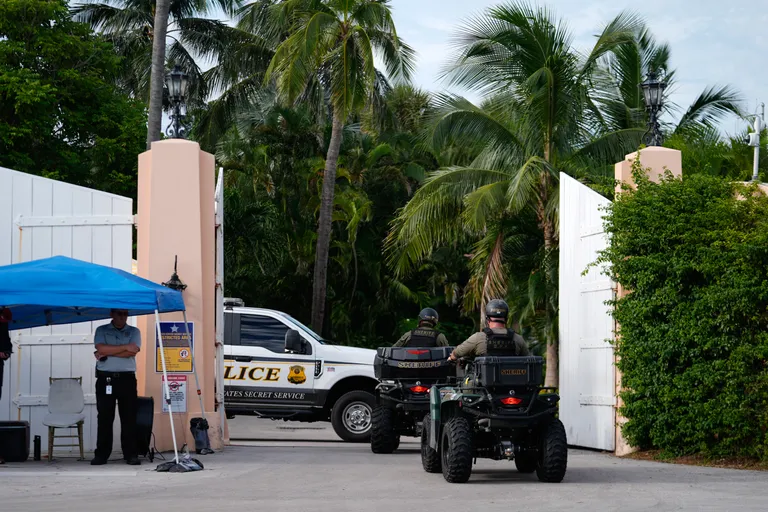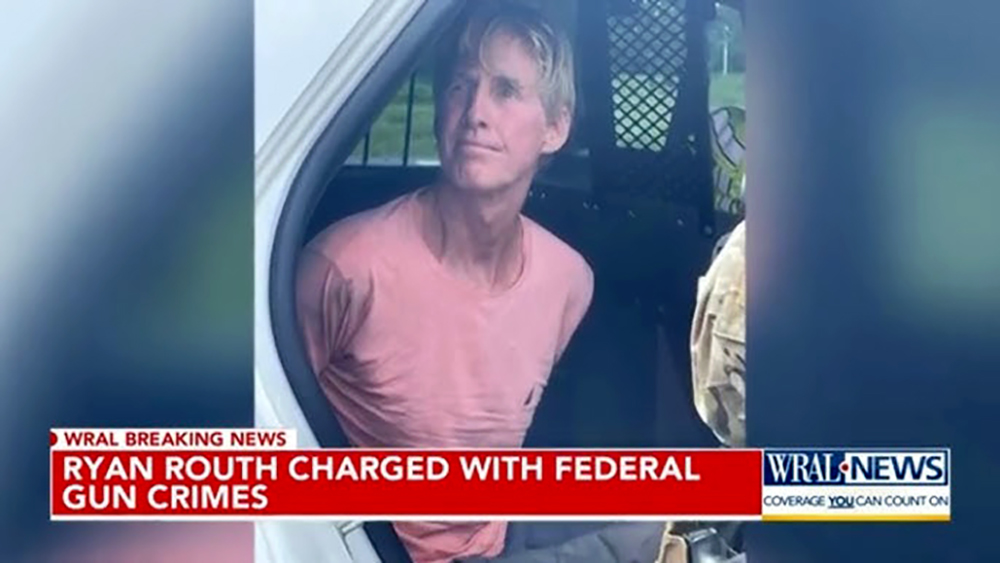|
Getting your Trinity Audio player ready...
|
Edited by: TJVNews.com
In a shocking twist surrounding Ryan Wesley Routh, the man accused of plotting to assassinate former President Donald Trump, his deep connections to Ukraine, and specifically the controversial Azov Brigade, are drawing increased scrutiny.
As reported by Zero Hedge, Routh’s story is more than just that of a lone radical—it’s one intertwined with Ukraine’s military and geopolitical conflicts.
Routh became a Western media darling in 2022 when he journeyed to Ukraine, ostensibly to join and recruit for its International Legion. For a time, major outlets like Newsweek, FT, and The New York Times painted him as a hero, with Zero Hedge noting his fervor in urging foreigners to fight alongside Ukrainians. “We need thousands of people here to fight,” Routh was quoted as saying, despite being rejected as too old to serve in combat himself.
The 58-year-old appeared determined, telling Newsweek the war was a clear-cut battle between “good and evil,” dismissing any nuance. By March 2022, he went so far as to call for people worldwide to volunteer to “fight and die” in Ukraine. Yet, much of his time seemed to be spent in a hotel in the western city of Lviv, according to Zero Hedge reports.

One of the more bizarre aspects of Routh’s involvement was his effort to recruit U.S.-trained Afghan special forces to Ukraine’s front lines. The scale of this operation raised eyebrows, with Routh himself claiming he was moving hundreds, if not thousands, of Afghan fighters into Ukraine.
According to Zero Hedge, this led some to wonder if Routh was working with the U.S. government or if officials were aware of his actions.
Routh’s volatile personality also became evident in a 2023 interview with The New York Times, where he threatened to shoot a fellow American who criticized him. This, combined with his recruiting efforts and media exposure, likely put him on the radar of U.S. authorities, suggests Zero Hedge. Routh was head of the International Volunteer Center in Ukraine, often boasting of his close connections with Ukraine’s Ministry of Defense, though his attempts to secure visas for foreign volunteers fell flat.
As reported by Zero Hedge, his ties to Ukraine’s notorious Azov Brigade are even more troubling. Despite repeated denials from the brigade, Routh’s name has been linked to the neo-Nazi group, which has long been shrouded in controversy. Even mainstream media has acknowledged that Azov was banned from receiving U.S. arms in 2014 due to its extremist ideology, though the U.S. State Department more recently lifted that ban.
A video surfaced, as per Zero Hedge, connecting Routh to a 2022 event supporting Azov’s Mariupol brigade. Though the Azov Brigade denies any official ties to Routh, the damage control by both Ukrainian officials and the group has only raised more questions.
Amid all this, it is clear that Routh’s connections in Ukraine run deep, and his involvement with the Azov Brigade adds a chilling dimension to his recent assassination plot against Trump. As Zero Hedge points out, it’s hard to believe the U.S. government wasn’t aware of Routh’s radicalization during his time in Ukraine. Now, the question is: Why wasn’t he investigated sooner?
Routh’s name continues to dominate headlines since Sunday, when the news was announced that former President Donald Trump narrowly avoided another assassination attempt.
According to law enforcement sources, including reports from Fox News, Routh was taken into custody after being spotted aiming an assault rifle through a fence at the Trump International Golf Club. Secret Service agents, positioned a few holes ahead of Trump, noticed the man and quickly responded by opening fire on him, prompting Routh to flee in a vehicle. Shortly afterward, he was arrested by local authorities, and an AK-47-style weapon was recovered at the scene.
The incident unfolded at approximately 1:30 pm at the Trump International Golf Club, just five miles from Trump’s primary residence at Mar-a-Lago, adding another alarming chapter to the former president’s increasing vulnerability to security threats as he campaigns for a return to the White House in the 2024 election.
It was subsequently revealed that Routh had a documented history of promoting left-wing causes on social media, according to law enforcement sources.

The FBI has classified the incident as an apparent assassination attempt against the former president. While further details about the suspect’s motives are still under investigation, the fact that Routh was armed with a high-powered weapon underscores the seriousness of the threat. Given Trump’s public persona and in American politics, security concerns surrounding his appearances have been heightened, especially in the run-up to the 2024 election.
In the hours following his arrest, a clearer picture of Routh’s background began to emerge. According to a report from The New York Post, Routh frequently used his social media presence to promote various left-wing causes. His online activity appears to reflect a consistent engagement with progressive issues.
Routh’s LinkedIn profile offers additional insights into his life, showing that he attended North Carolina Agricultural and Technical State University. The timeline of his life also indicates a major relocation around 2018, when he moved to Hawaii. While little is known about his activities in Hawaii, his online profile suggests he maintained a strong ideological commitment to causes aligned with the political left, raising questions about whether his political beliefs played a role in motivating the attack.
Fox News reported that according to his social media posts, Routh has expressed strong anti-Trump sentiments, frequently describing the former president as a “threat to democracy.” His rhetoric mirrors many talking points associated with the Democratic Party and left-wing political movements, indicating a deep disdain for Trump and his policies.
Routh’s posts also suggest he viewed Trump as a divisive figure whose actions were harmful to the country, further framing Trump as an adversary to democratic principles.
As was previously mentioned in this report, Routh was heavily involved with Ukraine activism and was involved with a group called the International Volunteer Center in Ukraine, which was dedicated to organizing volunteer military personnel for the Ukraine War. Zero Hedge blog noted that Routh was quoted in the mainstream press dozens of times. Below are some selections:
FT News:
“It’s a pretty big yard, but the front bank is completely full,” Ryan Routh, an American volunteer who started the memorial last year, said. “There may be 10,000 at this point. ‘Flags of the fallen’ is what I’ve been calling it.”
Routh, a former construction worker who lives in Hawaii, is one of the thousands of foreigners who, after seeing news reports about the invasion, travelled into Ukraine in early 2022 to volunteer as fighters or medics.
Semafor:
“Most of the Ukrainian authorities do not want these soldiers,” said Ryan Routh, head of the International Volunteer Center in Ukraine, a private organization which helps foreigners seeking to assist the war effort connect with military units and aid groups. “I have had partners meeting with [Ukraine’s Ministry of Defense] every week and still have not been able to get them to agree to issue one single visa.”
The New York Times article backs up the Russian Defense Ministry’s information regarding the countries which are actively trying to recruit mercenaries to join the fight in Ukraine. It wrote about Ryan Routh, a former construction worker from North Carolina who spent several months in Ukraine last year and is now seeking recruits among Afghan soldiers who fled the Taliban. He plans to move them to Ukraine from Pakistan and Iran – in some cases, illegally. Nevertheless, dozens of people have apparently expressed an interest.
NYTimes
With Legion growth stalling, Ryan Routh, a former construction worker from Greensboro, N.C., is seeking recruits from among Afghan soldiers who fled the Taliban. Mr. Routh, who spent several months in Ukraine last year, said he planned to move them, in some cases illegally, from Pakistan and Iran to Ukraine. He said dozens had expressed interest. “We can probably purchase some passports through Pakistan, since it’s such a corrupt country,” he said in an interview from Washington.
Taiwan News
The man behind the wall of banners, Ryan Routh, told CNA that he posted the flags to pay tribute to the nations that have citizens fighting in Ukraine’s foreign legion, the International Legion of Territorial Defense of Ukraine. Routh said there have been no protests about the presence of the Taiwan flag so far, put even if China is dissatisfied, “I can order another 1,000, they can’t touch my flags.”
The Secret Service has long recognized that golf courses pose a unique security challenge for any protectee, given their wide-open expanses, lack of cover, and the predictable movement of the player from hole to hole. This inherent vulnerability becomes even more pronounced in Trump’s case. Due to his regular visits to the golf courses he owns, his movements are relatively easy to predict, providing potential attackers with an opportunity to plan and execute their schemes.
The FBI quickly classified the incident as an attempted assassination. A campaign spokesman for Trump confirmed that the former president was unharmed but provided no further details, leaving questions about the suspect’s motivations and whether any accomplices were involved. The swift response from the Secret Service undoubtedly prevented what could have been a catastrophic event, but it also raised lingering concerns about the agency’s readiness and effectiveness, especially after a similar incident earlier in the summer.
This latest assassination attempt comes just two months after a deadly attack at a rally in Butler, Pennsylvania, where a gunman managed to bypass security measures and open fire on the former president from a rooftop 400 feet away. On July 13, 2024, during a rally speech, Trump was shot in the ear, sustaining a minor injury. The attack also resulted in the death of a rally attendee and left two others injured before Secret Service agents returned fire, killing the assailant, 20-year-old Thomas Matthew Crooks.
The Pennsylvania attack marked a turning point in the public discourse around Trump’s security detail. Critics of the Secret Service have since questioned how such an attack could have occurred despite their presence, noting that the agency’s primary function is to ensure the safety of current and former presidents. The successful approach of the gunman in Pennsylvania — and now, the close proximity of this latest attempt — has fueled doubts about the agency’s capacity to protect Trump during his high-profile appearances as he seeks re-election.
The Secret Service is facing unprecedented scrutiny in the wake of these incidents. The Pennsylvania rally assassination attempt in July was a stark warning, but the fact that another attempt was made in Florida so soon after raises questions about the agency’s preparedness and its ability to adapt to emerging threats. Although the agency successfully neutralized both gunmen before they could inflict more significant harm on Trump, the fact that both attackers were able to get dangerously close to the former president indicates a potential gap in intelligence or security protocols.
In the Pennsylvania case, Crooks was able to position himself on a rooftop and fire shots from a distance before being neutralized. The Florida attempt, though thwarted, involved a gunman using an AK-style weapon in close proximity to the former president, further escalating concerns about how the agency handles security in open, public spaces such as golf courses or large rallies.
Public criticism of the Secret Service’s performance has grown, particularly in light of Trump’s frequent appearances in outdoor venues, where securing a large, perimeter-rich area presents unique challenges. Critics argue that the agency needs to adopt more rigorous intelligence-gathering methods to anticipate and prevent such threats before they materialize. In particular, the use of drones, aerial surveillance, and enhanced background checks for venues and attendees could prove crucial in bolstering security.
For Trump, who thrives on his connection with large crowds, the danger posed by assassination attempts could complicate his campaign strategy. Public rallies and golf outings, which have long been central to his political image, are inherently risky in terms of security. The campaign’s ability to balance Trump’s need for visibility with the growing necessity for heightened security will likely become a major issue as the election season progresses.
Law-enforcement officials have expressed growing alarm over the increasing volume of threats related to political violence circulating online. In particular, fringe groups, including those with extremist ideologies, have used platforms such as X (formerly Twitter) and lesser-known social media networks to spread rhetoric that promotes violence against political figures, according to a report in The Wall Street Journal. The latest assassination attempt on Trump has seemingly catalyzed these discussions, with authorities warning that copycats or individuals inspired by the incident could pose a serious risk in the days and weeks ahead.
In the immediate aftermath of the assassination attempt, Trump’s response was swift, emphasizing his resilience and determination. In a fundraising campaign email sent to supporters, Trump reassured his base, declaring, “I AM SAFE AND WELL!” But more notably, he went on to add, “Nothing will slow me down. I WILL NEVER SURRENDER!”
For Trump, the assassination attempt, rather than being a deterrent, serves as a symbol of the opposition he faces from those who wish to undermine his movement. By framing the attack in this way, he reinforces his image as a fighter who is willing to withstand any obstacle, be it legal challenges or physical threats, in his pursuit of re-election.





